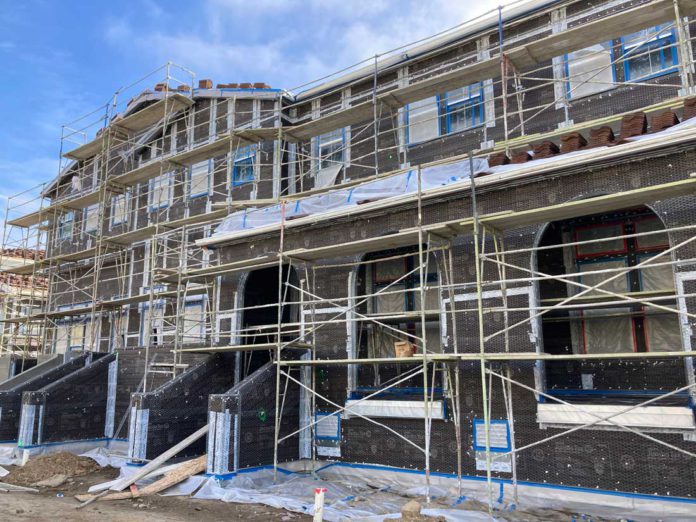
Infrastructure for gas appliances—including stoves and water heaters—will remain prohibited in new homes in Morgan Hill after the city council heard a review of the local ban at a recent meeting.
Mayor Mark Turner earlier this year had requested that city staff return to the council with a report on the ban on new gas infrastructure, which the council originally passed in 2019.
At the Dec. 6 council meeting, after hearing from city staff and local teens who urged the city to resume the ban in Morgan Hill’s ongoing efforts to combat climate change, Turner and his council colleagues ultimately decided to leave the ordinance in place.
Turner said in his discussions with people in the building and real estate industry leading up to the meeting, he determined that since the community and the state are already moving in the direction of all-electric structures they should keep going that way. That’s despite the fact that real estate agents and builders have told him that clients generally prefer gas appliances, according to Turner.
“I don’t think I can make a reasonable vote against the (gas appliance infrastructure) ban,” Turner said at the Dec. 6 meeting. “Nothing has convinced me otherwise. This is something we as a city have to comply with.”
The council voted 5-0 to keep the gas infrastructure ban in place.
Adopted in 2019, the ordinance eliminates all gas infrastructure in new residential and commercial buildings in Morgan Hill—thereby requiring new structures to be all-electric. The ban applies to infrastructure for gas stoves, water heaters, furnaces and clothes dryers, Morgan Hill Environmental Services Administrator Tanya Carothers explained.
Morgan Hill was one of the first cities in the Bay Area to adopt such a ban, and did so in an effort to reduce greenhouse gas emissions in line with local and state goals, and to comply with regional and statewide regulations on gas appliances that are on the horizon, Carothers said.
“Keeping this prohibition will prepare our community for what’s coming from the state,” Carothers said.
Keeping the 2019 ordinance intact also complements the city’s 2021 Climate Action Plan, which spells out a number of steps the city could take to reach the goal of reducing greenhouse gas emissions from the building and transportation sectors to 35% of 2020 levels by 2030.
Gas combustion in buildings is currently the second largest source of climate changing emissions in Morgan Hill, behind transportation, Carothers added, and the ban on new gas infrastructure seems to be having an impact.
According to Silicon Valley Clean Energy, Morgan Hill’s emissions from energy consumption and transportation in 2022 were 77% of what they were in 2015.
“This requirement has been a significant driver of the city’s greenhouse gas emission reductions that are approximately equivalent to the greenhouse gas emission reductions achieved by other Silicon Valley agencies,” says a city staff report that cites data from SVCE.
The 2019 ordinance was also adopted with a number of findings that declare all-electric facilities are cleaner and more cost effective than gas-powered homes and businesses. Specifically, according to city staff, those findings include:
– Substituting electric infrastructure in new buildings is linked to lower greenhouse gas emissions;
– Conditions in Morgan Hill that make the community more susceptible to impacts from climate change include the frequent occurrence of wildfires, reductions in the availability of crucial imported water due to climate change and the proximity of fault lines that can result in large earthquakes that could damage gas infrastructure and cause even more fires;
– Poor indoor and outdoor air quality resulting from gas emissions exacerbates health impacts for those who suffer from asthma and other conditions;
– And the most cost-effective time to integrate electrical infrastructure in a new building is in the design phase.
Carothers also told the council Dec. 6 that a number of regulations adopted by state and regional agencies in recent years will eventually require Morgan Hill to transition to all-electric construction anyway. Some of these will make it difficult for consumers to even find new gas appliances.
For example, the Bay Area Air Quality Management District has adopted new rules that will prohibit the sale and installation of gas water heaters in the Bay Area by 2027; gas furnaces by 2029; and large commercial water heaters by 2031.
Although the council upheld the gas infrastructure ban unanimously, some members had concerns. Council member Gino Borgioli worried that the costs of going all-electric will be prohibitive for the “end user” such as a homeowner or resident who might have to upgrade. New electric stoves cost significantly more than gas stoves, for example, Borgioli noted.
Carothers said that avoiding gas infrastructure in new all-electric homes can save about $6,000 per home in construction costs.
Among those who spoke in support of preserving the gas ban during public comment Dec. 6 were local high school students who are members of the Morgan Hill Youth Climate Action team. That team was instrumental in urging the council to adopt the Climate Action Plan in 2021.
“I’m hopeful the City of Morgan Hill would follow through with the vision in the climate action plan,” said Live Oak High School junior Sofia Ruiz McGinty.
Turner noted that council’s unanimous Dec. 6 vote was even more committed than the 4-1 vote for the ordinance in 2019. At that time, former Mayor Rich Constantine voted against the gas infrastructure ban.
Council member Rene Spring voted in support of the ban both on Dec. 6 and in 2019.
“It was the right thing to do then and it is still the right thing to do to continue it,” Spring said.







